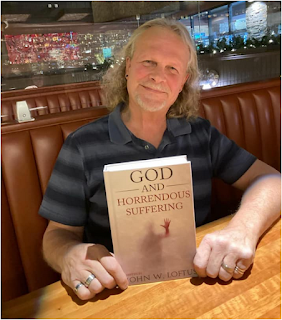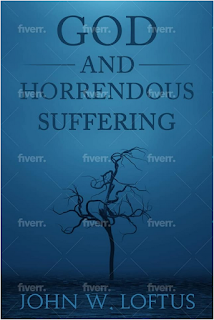Note: “Mrs. Jane Ortega” and “Michael Ortega” mentioned below are real people whom I have come to know and been corresponding—only their names have been changed to protect their identities. And, uh…well, the letter pretty much explains the rest…
“Dear Mrs. Ortega,
I hope this email finds you doing well. Being that we have been acquainted with each other for some time now, and being that we have had the opportunity to look at the academic side of the problem of evil, I wanted to offer a finishing piece to “drive home,” as it were, what has been discussed.
Please understand that the things I will mention are not intended to be insulting or hurtful, but are to make clear to you that you have not taken to heart what we are debating. The problem of evil is an emotional argument, as well as a logical argument, and that is why the best Christian apologists in the world keep coming back to reconsider it. When one seeks to avoid the logical force of the problem, they are confronted with the emotional discomfort created by it, and this makes them reconsider the logical force of it once again. This is always the situation when people say the problem of evil “doesn’t affect” (your words) them. Like a sleeping pill, the problem hasn’t affected you because you haven’t digested it yet!
As you know, I met your son Michael at the bus station. That put me in touch with you, which, of course, I deem a good thing. But the unfortunate circumstance of your son is not a good thing. It is a terrible thing.
Each time I see him I think to myself how hard it must have been for you to raise a kid like that, and for forty-two years straight, be reminded of the fact that he will never be a normal man, that he will never pay his own bills, and that his brain will never stop requiring a handful of special pills everyday just to keep him out of trouble with the law. He will never get married and bring you grandchildren. He will never hold down a normal job or live in so much as a budget-sized apartment by himself. He will never host a thanksgiving dinner for the family, will never tend to his share of the chores, or even clean his own clothes. I deeply feel for you, and although, right about now you’re probably preparing to tell me how much of a joy and a gift from God you consider your son to be, even with all the heartache that raising a severely bi-polar/schizophrenic can be, I’m here to tell you no less forcefully that you don’t deserve it.
You don’t deserve any of this. You are a good woman, a wonderful person, and you deserved to get a son who would carry on your legacy, who would take care of you in your older years. But you don’t have that. Instead, your son has given you a bruised lip and broken furniture on more than one occasion. Your son consumed Palmolive dish soap and thumbtacks as a means to end his life earlier this year. Someone clueless enough to try and kill himself in a manner such as this is worthy of the utmost pity. That alone is a fountain of sadness. Your son has been arrested a great many times, and each time, could not make a single coherent statement in his defense. These are monumentally sad facts that I know you are aware of, but there is a reason for why I am reminding you of them—and I think you know that reason.
I want to tell you what your boy said to me the other day. I was standing guard in the bus terminal as usual when he approached me and immediately began to carry on about how cruel you were to him as a child, throwing him in snake pits and whipping him with thorns from rose bushes. As he stood in my face, twitching madly, I gently moved him out of my personal space and began for the fourth time this week to assure him that you did none of those things to him, that it was all in his mind. Failing to get through to him, I tried to convince him that even if he still feels that way about you that he should try and just move on with his life, and not go around telling complete strangers about it and having them come to me and ask to have him removed from the facility because he won’t leave them alone.
I could tell by looking into his distant eyes that he comprehended not a word I said. He went right on accusing you and the government of poisoning him with bitter herbs and by putting deadly sound waves in the Rod Stewart songs he likes to listen to. It’s so sad to see him walking around like that, in a never-clearing fog of paranoia and disorientation. I had to ask him to leave the station again a few days ago (but I think I already told you that the other day).
I know you love him and try to hug him before he goes to pushing you back away from him at your weekly monitored meetings. In tears, you assure him you love him, but it does no good. You do love him, and you always will, and no one’s saying you shouldn’t, but I’ve seen how you break down every time you are around him. It crushes you to see him in such pain and not be able to do anything about it or get close to him. That must hurt in a way that only a mother can know. He’s such a handsome man too—if only he had a normal mind.
Frankly, if your son is a gift from God, then God doesn’t think much of you at all. If such a higher power exists, he hates you or else couldn’t care less about you; there’s simply no other way of putting it. Now I don’t find it sound to believe that a deity hates you or loves you. You deserve so much better, but unfortunately, there is no God who will do you better.
For the last four or five conversations, we have been discussing the problem of evil, and in that time, you have acquitted your God of all charges of cruelty and evil. I would ask that you keep deliberating on this, and when you are ready, look your son in the eyes the next time you see him and ask yourself: “Do I really and truly deserve this?” What does your heart of hearts tell you? The only way the problem of evil can be ignored is when the problem is someone else’s, but when the problem becomes your own, it is impossible to ignore.
You are a very strong person, Jane, so strong that you have been able to take in stride and accept what would be too much for some people. Maybe you will one day be strong enough to accept yet another unpleasant truth.
Best regards,
(JH)”



